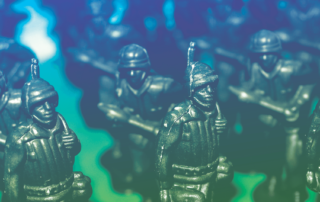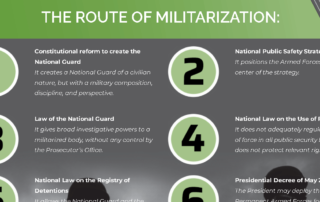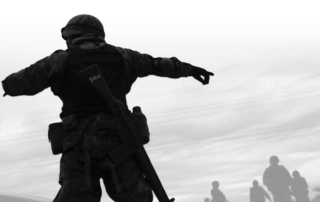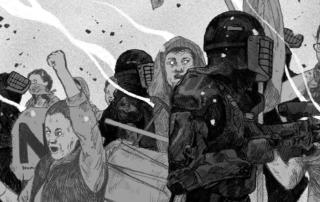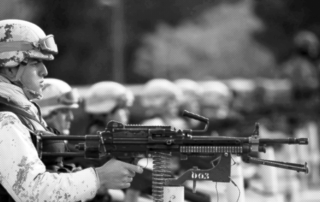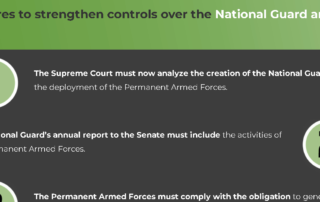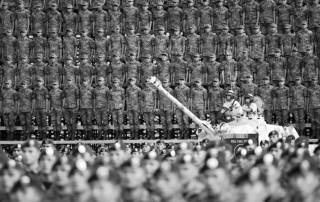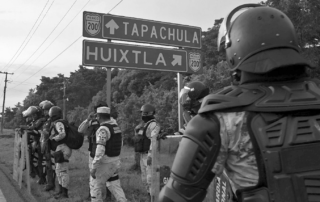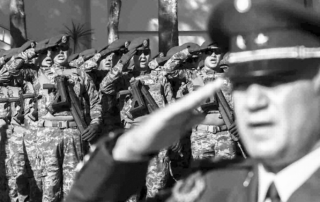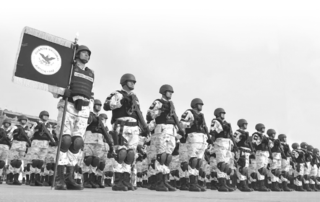Photo: Reuters
Militarization without controls
The deficiencies in the controls envisaged for this new body are also a matter of utmost concern, as their omissions and weaknesses prevent them from being able to act as a counterweight and surveillance mechanism to a far-reaching militarization process.
Photo: Cuartoscuro
According to the National Guard Law, its main internal control is the Internal Affairs Unit. The law sought for this position to have objective and subjective conditions of independence. However, the Unit is headed by a retired Brigadier General who was part of the Military Judicial Police—an opaque body prone to human rights violations.
It is also not clear that the appointment was made from the Presidency.
The numbers illustrate the ineffectiveness of these controls. In just under two years, the Unit received more than 3,400 complaints. Only thirty-nine were determined to be appropriate and the Disciplinary Councils, made up of commanders from the Guard, will be the ones to ultimately resolve these.
On the other hand, the National Guard determined that, of 161 events in which force was used, there was no excessive force used in any of them. This is not convincing in a context in which the accused body itself is conducting the investigation, especially when it reported that it has at least thirty-three records of reports or complaints of excessive use of force.
When attempting to further analyze this information by requesting the detailed reports on the use of force referred to in Article 32 of the National Law on the Use of Force, the National Guard stated that this information is reserved or confidential for five years.[1].
As can be seen, the military composition of the Internal Affairs Unit may mean that it does not carry out its work exhaustively. On the other hand, the fact that a collegiate body of officers of the corporation itself –predominantly of military extraction—ultimately decides on these behaviors, does not ensure either due process or thoroughness in the analysis. Additionally, detailed reports on the use of force are reserved and kept obscure.
Despite the fact that we have fought this lack of transparency, even prevailing in processes in front of the Federal Institute for Access to Public Information and Data Protection (INAI),[2] the National Guard persists in its refusal to comply with them.
In addition, it is serious that the National Guard reports that among the behaviors analyzed there are crimes that should be investigated by the Federal Attorney General and not by the body itself.
Regarding external controls, the Constitution and the National Guard Law oblige the National Guard to render an annual report to the Senate. The corporation presented a First Report corresponding to year 2019, which was approved in November 2020. The one corresponding to 2020 was not presented until July 2021 before the Senate, although it was possible to obtain it via an access to information request.
The delay in the presentation and discussion of these reports, the fact that authorities from the Ministry of Public Safety and the National Guard have not appeared before the Senate, along with the fact political parties have not entered into an in-depth discussion of the reports are factors that influence that the presentation of said reports is not translating into the exercise of accountability that was proposed by the law and that, therefore, does not produce true accountability.
On the other hand, if the Permanent Armed Forces have been empowered to carry out public safety tasks until 2024, it would be expected that the parliamentary control provided for in the National Guard Law would be extended so that the Army, Navy, and Air Force also gave an account in said report regarding their deployment. This, however, is not happening.


